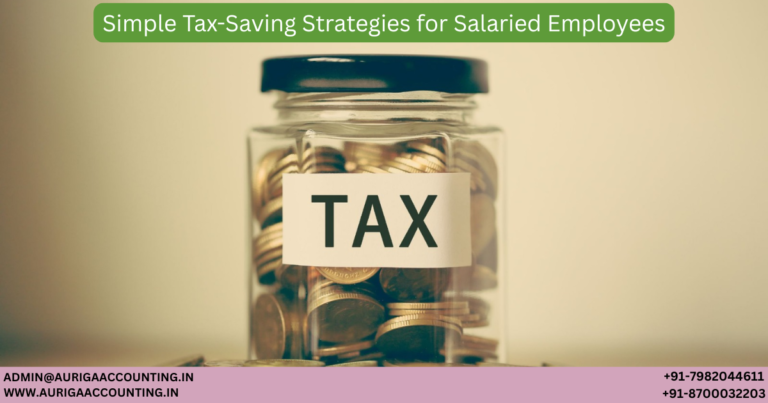
Revised GST Rules for FY 2025–26
Introduction
ToggleMandatory ISD Registration Effective April 1, 2025
Until now, businesses operating with multiple GST registrations under a single PAN had the option to either use the Input Service Distributor (ISD) model or rely on cross-charging to allocate common input services—such as rent, audit fees, and software subscriptions—across different units. While cross-charging was often seen as simpler, it frequently resulted in challenges related to ITC distribution and tax reconciliation.
However, from April 1, 2025, ISD registration will become mandatory for such businesses.
Under the new compliance framework:
Businesses must obtain a dedicated ISD registration.
They are required to issue ISD invoices for distributing Input Tax Credit (ITC).
Filing of GSTR-6 returns becomes compulsory for proper allocation of ITC among branches.
Revised GSTR-7 and GSTR-8 Formats Effective February 11, 2025
As per Notification No. 09/2025–Central Tax, dated February 11, 2025, the Government has introduced key amendments to GSTR-7 and GSTR-8 forms. These revisions aim to enhance transparency, improve compliance accuracy, and strengthen data validation mechanisms for tax authorities.
GSTR-7: TDS Return for Tax Deductors
The updated GSTR-7 format now mandates invoice-wise and document-level reporting of tax deducted at source (TDS). Notable changes include:
GSTIN of the deductee
Invoice number and date
Invoice value and amount paid
Tax deducted under CGST, SGST/UTGST, and IGST
These enhancements are intended to facilitate better reconciliation of TDS by suppliers and provide a stronger audit trail for tax scrutiny.
GSTR-8: TCS Return for E-Commerce Operators
The revised GSTR-8 form requires detailed transaction-level data of supplies made via e-commerce platforms. Key improvements include:
Greater visibility into itemized sales transactions
Improved accuracy in Tax Collected at Source (TCS) reporting
Simplified reconciliation for sellers operating on online marketplaces
These updates are designed to ensure consistency in reporting, reduce mismatches, and support efficient compliance.
What Should Affected Taxpayers Do?
Entities such as TDS deductors, government agencies, and e-commerce operators must:
Upgrade their compliance and reporting systems
Ensure accounting software is equipped to capture the new mandatory data points
Train internal teams to adapt to the updated formats
Updated e-Way Bill and E-Invoicing Timelines Effective April 1, 2025
New Time Limits on e-Way Bill Generation and Extension
To enhance transparency in goods movement and curb misuse, the government has introduced stricter rules for e-Way Bills:
Generation Restriction:
From January 1, 2025, e-Way Bills can only be generated for documents issued within the last 180 days.
Example: Invoices dated before October 3, 2024, will no longer be valid for e-Way Bill generation on or after April 1, 2025.Extension Cap:
e-Way Bill extensions will now be restricted to a maximum of 360 days from the date of original generation.
Example: An e-Way Bill created on April 1, 2025, can only be extended until March 27, 2026.
These changes aim to ensure timely tracking of goods and prevent the use of outdated or backdated documents to evade tax.
30-Day E-Invoice Reporting Mandate Expanded
In a bid to tighten e-invoicing compliance, the government has widened the scope of the 30-day invoice reporting rule:
Effective April 1, 2025, all businesses with Annual Aggregate Turnover (AATO) above ₹10 crore must report B2B e-invoices to the Invoice Registration Portal (IRP) within 30 days of the invoice date.
Previously, this rule applied only to businesses with AATO exceeding ₹100 crore.
Consequences of Late Reporting:
Invoices not reported within the 30-day limit will be rejected by the IRP.
Businesses will be unable to generate Invoice Reference Numbers (IRNs).
This can lead to:
Disallowed Input Tax Credit (ITC)
Delays in compliance
Disruptions in billing and supply chain workflows
What Businesses Should Do
To stay compliant:
Update ERP and billing systems to ensure timely e-invoice reporting.
Automate invoice validations and IRN generation.
Educate finance and logistics teams about the revised deadlines
Mandatory Multi-Factor Authentication (MFA) for All GST Users
Starting FY 2025–26, Multi-Factor Authentication (MFA) is now compulsory for all taxpayers accessing GST portals. This enhanced security measure is aimed at safeguarding sensitive tax data and preventing unauthorized access.
How MFA Works
Users must authenticate using at least two factors, such as:
Password
One-Time Password (OTP) via SMS
OTP generated through GSTN’s official apps: Sandes or NIC-GST-Shield
To support this, GSTN has introduced a mobile app for Time-Based OTPs (TOTPs), offering users an alternative to SMS-based OTPs.
Why This Matters
Stronger protection against data breaches
Reduced chances of fraudulent GST filings
Enhanced user confidence in the GST system
Seamless authentication via GSTN-supported apps
Sequential GSTR-7 Filing Now Mandatory (Effective November 1, 2024)
A new rule mandates that Tax Deductors under Section 51 must file GSTR-7 returns in chronological order. The portal will block future filings if earlier returns—including Nil returns—are pending.
Key Updates
No Skipping Allowed: Returns must be filed in sequence; missing months will halt current filings.
Nil Return Requirement: If no TDS was deducted, a Nil GSTR-7 must still be submitted.
Lower Late Fees: Penalties have been rationalized to promote timely compliance.
Action Steps
Check for and file any pending or missed GSTR-7 returns.
Establish internal SOPs to ensure uninterrupted, timely filings
Biometric Authentication Mandatory for Company Directors
From March 4, 2025, all company promoters and directors—including those from foreign entities—must complete biometric authentication as part of the GST registration process.
Key Points
Where: Any GST Suvidha Kendra (GSK) within the director’s home state
What’s Required:
Fingerprint scan
Facial recognition
On-site photo capture
Physical document verification
Who Must Comply
New GST applicants from private, public, and foreign companies
This update, per GSTN Advisory dated April 3, 2025, enhances security and simplifies the verification process by eliminating jurisdiction-based restrictions for authentication.
GST Rate Reforms for Hotels and Used Cars – Effective April 1, 2025
GST Rate Reforms for Hotels and Used Cars – Effective April 1, 2025
The government has announced major GST updates to simplify tax compliance and promote fairness in the hospitality and used car sectors, effective from April 1, 2025.
A. Hospitality Sector – GST Based on Actual Transaction Value
Key Changes:
The “Declared Tariff” concept is eliminated.
GST will now apply on the actual transaction value charged to customers.
Accommodation priced above ₹7,500/day will attract 18% GST.
Full Input Tax Credit (ITC) allowed on hotel accommodation and restaurant services where applicable.
Benefits:
Simplified Compliance: Removes ambiguity around tariff declarations and reduces litigation risk.
Fair Taxation: Ensures tax reflects the price actually paid, not outdated or inflated rates.
Improved ITC Utilization: Hotels benefit from enhanced credit availability and better cash flow.
B. Used Car Sector – Uniform GST at 18% on Margin Value
Key Changes:
A single 18% GST rate applies to all used car sales, regardless of type, engine size, or fuel category.
Earlier differentiated rates (e.g., 12% for small cars and EVs) are now harmonised.
Valuation (As per Rule 32(5) of CGST Rules, 2017):
GST is charged on the margin value = Selling Price – Purchase Price.
If the margin is negative (a loss), no GST is applicable.
Applicability:
Applies to registered dealers in second-hand goods under GST norms.
New Invoice Series & Turnover-Based Compliance – Starting April 1, 2025
To support structured invoicing and transparency, all taxpayers must implement a new invoice series from the start of each financial year.
Requirements:
Fresh invoice series required from April 1, 2025.
Invoice numbers must be sequential, non-repetitive, and not reset mid-year.
Separate series for invoices, credit notes, and debit notes.
Multiple series allowed across business verticals, branches, or units.
For E-Invoicing Taxpayers:
Taxpayers with Annual Aggregate Turnover (AATO) over ₹5 crore in any past financial year must generate e-invoices.
GST Waiver Scheme 2024 (Amnesty) – Relief for Past Dues
Under Section 128A of the CGST Act, 2017, the government has introduced a one-time waiver scheme for taxpayers with pending dues from the early GST years.
Key Highlights:
Covers FY 2017–18 to 2019–20.
Full waiver of interest and penalties if principal tax dues are paid by March 31, 2025.
Taxpayers must file Form SPL-01 or SPL-02 by June 30, 2025.
Quick Summary: Key GST Changes Effective FY 2025–26
Reform | Effective Date | Summary |
|---|---|---|
Mandatory ISD Registration | April 1, 2025 | For businesses with multiple GSTINs under one PAN |
Updated GSTR-7 & GSTR-8 | February 11, 2025 | Invoice-level reporting for TDS/TCS |
e-Way Bill Validity Limits | April 1, 2025 | Invoices older than 180 days ineligible; extension capped at 360 days |
30-Day E-Invoice Rule | April 1, 2025 | Applies to businesses with AATO > ₹10 crore |
MFA for GST Login | FY 2025–26 | Two-factor authentication mandatory |
Sequential GSTR-7 Filing | November 1, 2024 | Nil returns also mandatory to maintain sequence |
Biometric Authentication | March 4, 2025 | Required for all company directors |
Hotel GST Reforms | April 1, 2025 | Tax based on actual price; full ITC allowed |
Used Cars – 18% GST | April 1, 2025 | Flat rate on margin value across all types |
New Invoice Series | April 1, 2025 | Yearly, unique, and sequential invoice numbering |
GST Waiver Scheme | Apply by June 30, 2025 | Interest & penalty waived if principal paid by March 31, 2025 |
Make GST Compliance Easy with IndiaFilings
Navigating the latest GST updates? From ISD registration and invoice series changes to e-invoicing deadlines and revised e-Way Bill or TDS/TCS rules—Auriga Accounting pvt. ltd. is here to simplify it all.
Need assistance with GST-compliant invoicing? Unsure about updated return formats or filing timelines? Looking to enable secure Multi-Factor Authentication (MFA)?
Our GST specialists will take care of the compliance—so you can stay focused on growing your business
About the Author
Muskan
Muskan is an experienced legal content writer known for transforming complex legal topics into clear, practical insights. Her writing helps entrepreneurs confidently understand and navigate business laws, empowering them to start, grow, and manage their ventures with greater ease and compliance












